Key takeaways:
- Gender equality advocacy is a collective human issue, emphasizing the importance of understanding intersectionality in experiences of oppression.
- Support groups foster community, provide validation, and empower individuals through shared stories and mutual encouragement.
- Personal growth occurs through discussion and vulnerability in support groups, leading to transformative insights on gender issues.
- Taking action beyond the group involves advocating for marginalized voices and creating opportunities for dialogue in everyday settings.
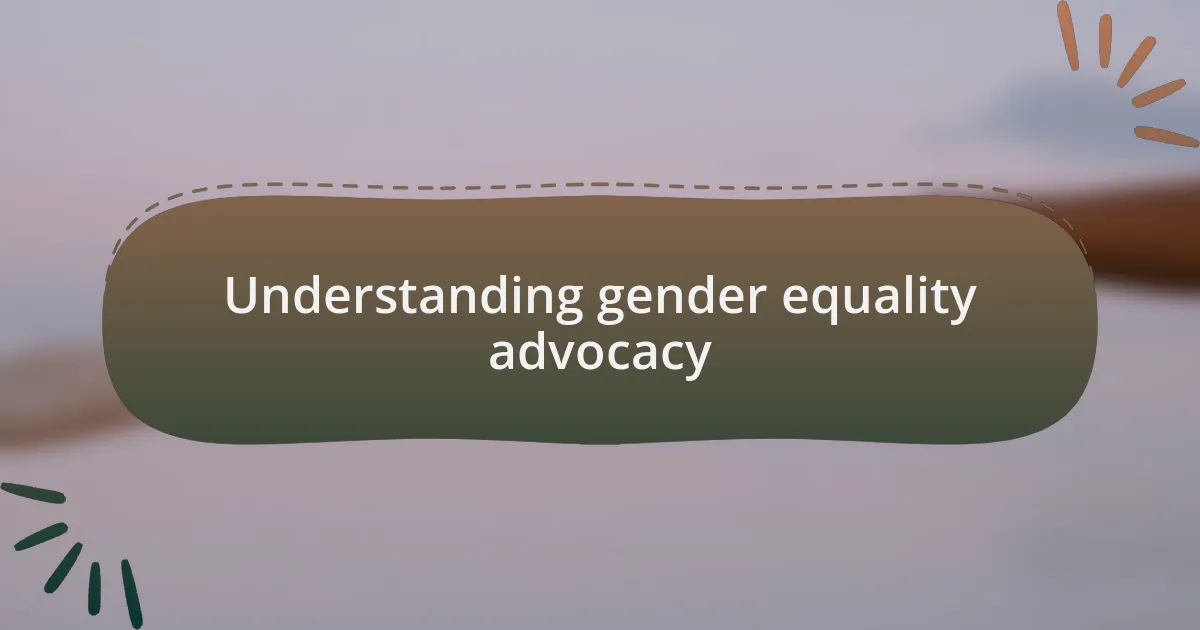
Understanding gender equality advocacy
Gender equality advocacy is a movement aimed at ensuring individuals of all genders have equal rights, responsibilities, and opportunities. I remember a moment in my own journey when I realized just how deep-rooted the issues of gender inequality are—I was shocked to learn that many women in my community faced barriers to basic rights and opportunities just because of their gender. This sparked a passion in me to not just understand, but actively contribute to change.
What resonates deeply with me is the idea that gender equality is not just a women’s issue; it’s a human issue that affects us all. Have you ever considered how often societal norms dictate our roles and limits? As I engaged with various groups, I discovered that men and women alike expressed frustration over these restrictive norms. It created a sense of shared purpose, uniting us in the fight for equity.
Understanding gender equality advocacy means recognizing intersectionality—the way various social identities like race, class, and sexual orientation intersect and affect experiences of oppression. During discussions in support groups, we unearthed how our unique stories taught us aspects of inequality that statistics never fully capture. This realization not only deepened my empathy but also reinforced the need for inclusive dialogue in driving our advocacy forward.
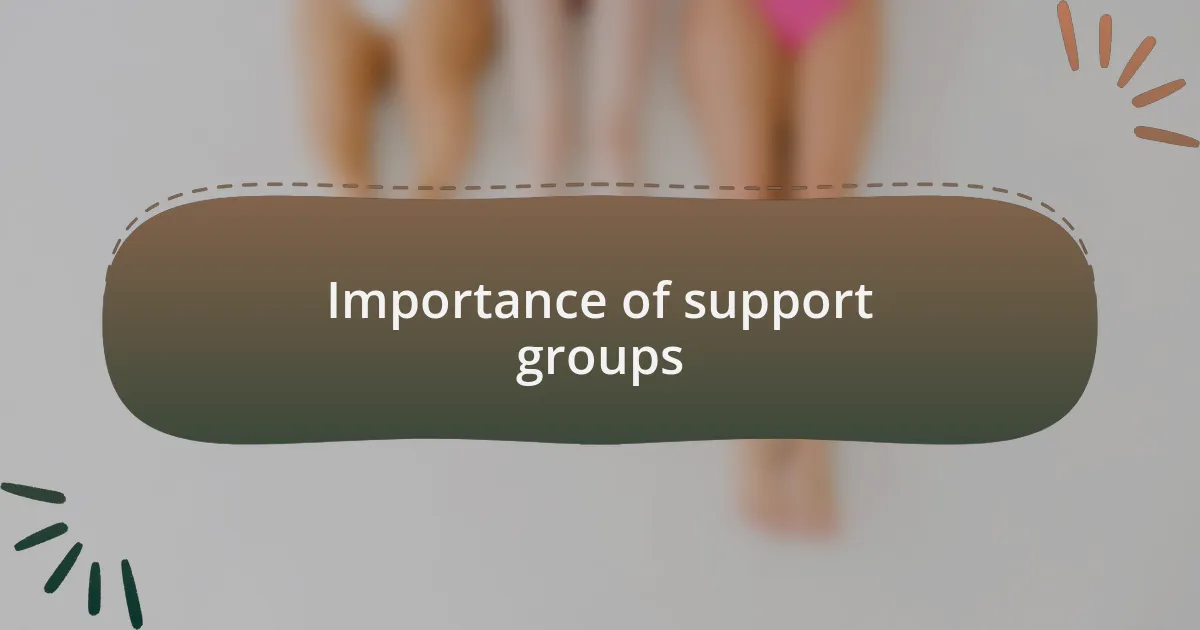
Importance of support groups
Support groups play a critical role in fostering an environment where individuals can share their experiences and emotions openly. I recall a session where a participant bravely recounted her struggles with workplace discrimination. It was powerful to witness how her story resonated with others, revealing shared feelings of frustration and isolation. Have you ever felt alone in your struggles? Support groups provide a space where you realize you are not alone in your journey, which can be incredibly validating.
Engagement in support groups creates a sense of community that is often missing in mainstream discussions about gender equality. It’s in these circles that I found allies and friends who not only understood the challenges we faced but also motivated each other to take action. The mutual encouragement can spark change, not just at an individual level but also ripple out into our communities. Isn’t it inspiring to think how shared experiences can lead to collective action?
Moreover, support groups offer the chance for personal growth through confrontation and dialogue. I’ve often emerged from discussions feeling empowered, with new insights that reframe my understanding of gender issues. They not only challenge our perceptions but also help to dismantle internalized biases. How transformative is it to have your thoughts and beliefs challenged constructively? It’s through these exchanges that I’ve witnessed the potential for profound change within individuals and the larger advocacy movement.
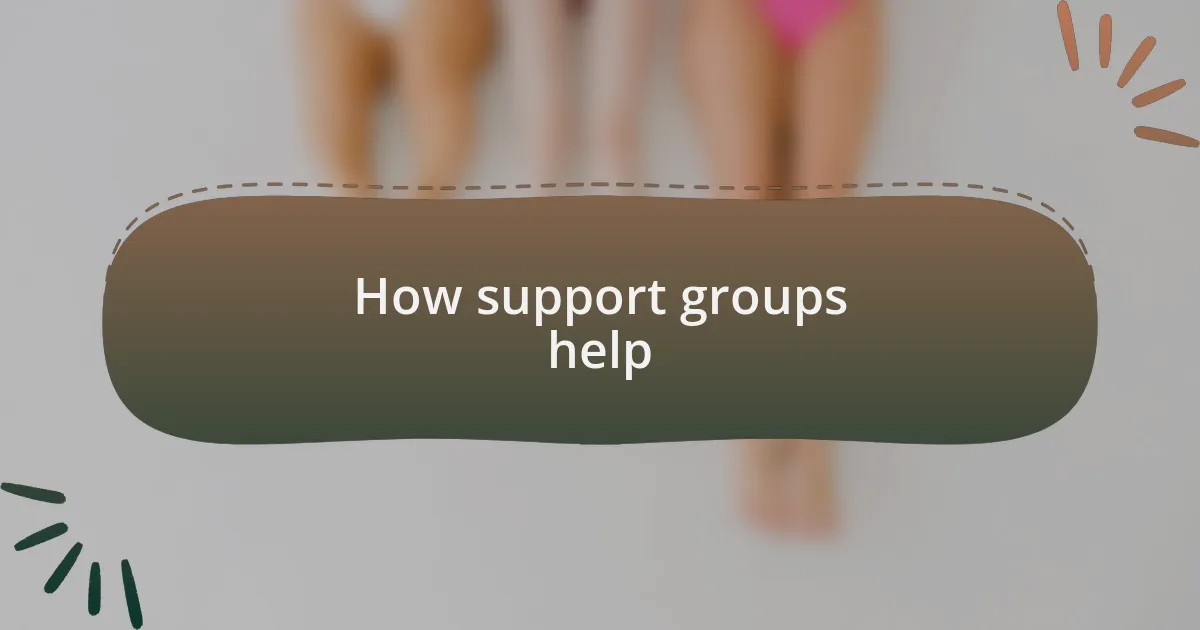
How support groups help
Support groups create an invaluable support network, providing a safe haven for individuals to express their feelings and frustrations about gender-related issues. During one meeting, I saw how sharing personal experiences not only fostered empathy but also sparked enlightening discussions about resilience. It reminded me how critical it is to have a space where our voices are heard, don’t you think?
The power of connection in support groups cannot be understated. I remember one member who had been silent for weeks finally opened up about her journey. The moment she shared her story, the group’s compassion was palpable; it was as if her bravery gave others permission to speak their truth as well. That ripple effect reinforces the notion that support is a two-way street. Isn’t it remarkable how vulnerability can catalyze strength within a community?
Additionally, the educational aspect of support groups is profoundly impactful. In our discussions, we frequently tackled misconceptions that permeate society about gender equality. By sharing resources and insights, I felt we were not just helping each other but also equipping ourselves to become better advocates. Don’t you find that when you learn in a supportive environment, the information sticks better? The collaborative nature of these groups transforms us into informed allies, ready to challenge the status quo together.
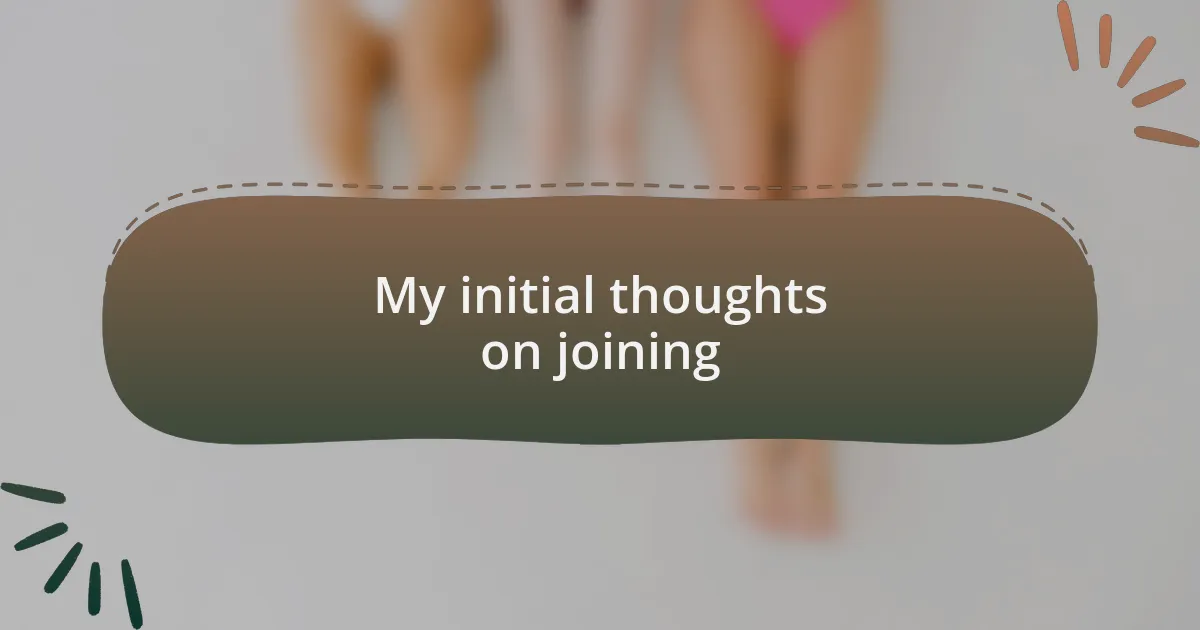
My initial thoughts on joining
Initially, I was filled with a mix of excitement and apprehension as I considered joining the support group. I couldn’t help but wonder if anyone else would resonate with my experiences. Would my voice matter among so many others? Reflecting on this, I realized that many of us carry the weight of similar stories, and that shared understanding could be a powerful catalyst for connection.
As I walked into my first meeting, I felt a surge of vulnerability wash over me. The room buzzed with nervous energy, and I could see the hesitance on everyone’s faces. In that moment, I recognized that we were all seeking solace in the same fight for equality. It felt oddly comforting to know that I wasn’t alone in my questions and doubts – it made the uncertainty a bit easier to shoulder together.
What struck me most during those early moments was the palpable mixture of hope and fear that filled the air. It’s fascinating how just stepping into a room full of like-minded individuals can ignite a sense of community. I began to envision the friendships and support that could blossom from our shared pursuit of gender equality. Wouldn’t it be amazing if we could transform our collective fears into affirmations of strength? I felt an undeniable pull to be part of something greater than myself.
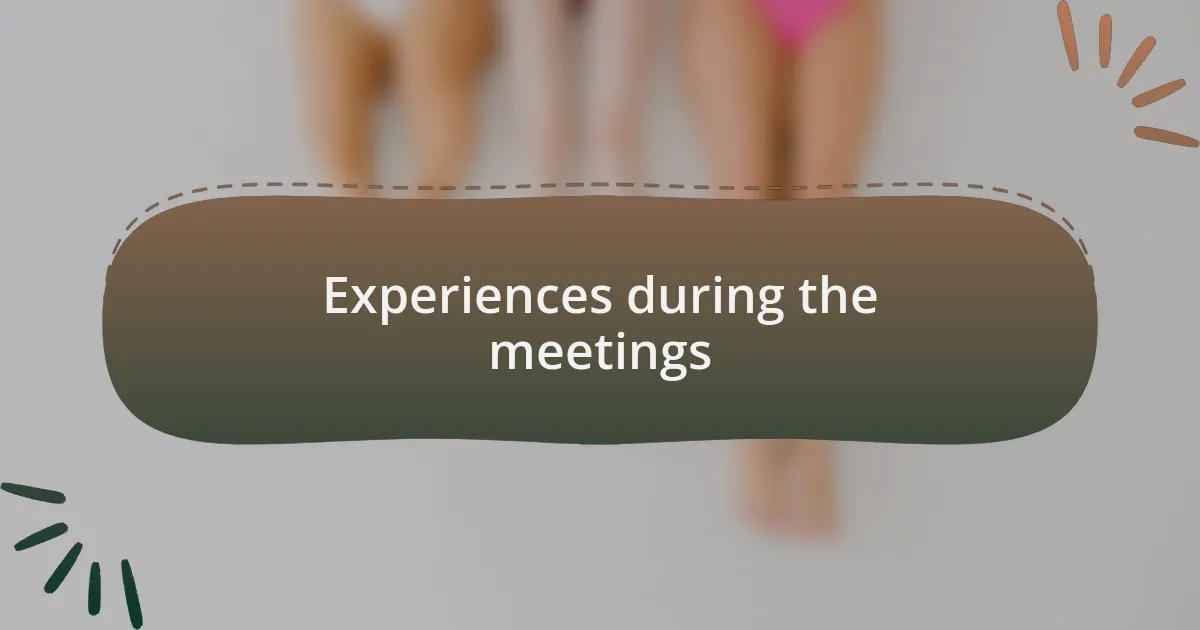
Experiences during the meetings
During the meetings, I found myself surprised by the collective wisdom that emerged from our discussions. Each person’s story seemed to resonate, echoing my own struggles and triumphs. I still remember a woman who spoke about the challenges she faced at work; her vulnerability sparked a deep conversation that left us all reflecting on our shared experiences and the obstacles we continue to confront in our daily lives.
As we delved deeper into conversations, I felt a warmth growing within me, a sense of belonging that was hard to describe. It was as if the barriers we often build around ourselves began to dissolve in that supportive environment. I vividly recall a moment when someone shared a small victory – standing up against a sexist remark. That simple act of courage ignited a wave of applause and uplifting energy among us. Who would’ve thought that one act could inspire a room full of strangers?
In contrast, there were moments of silence that felt heavy yet insightful. When someone would struggle to voice their thoughts, it became a reminder of how personal and profound these topics are. I learned that it was okay to sit in the discomfort, to let the silence provide space for reflection. This was a unique aspect of our meetings: we weren’t just speaking; we were listening, validating one another’s feelings, and often, the silence became its own form of support.
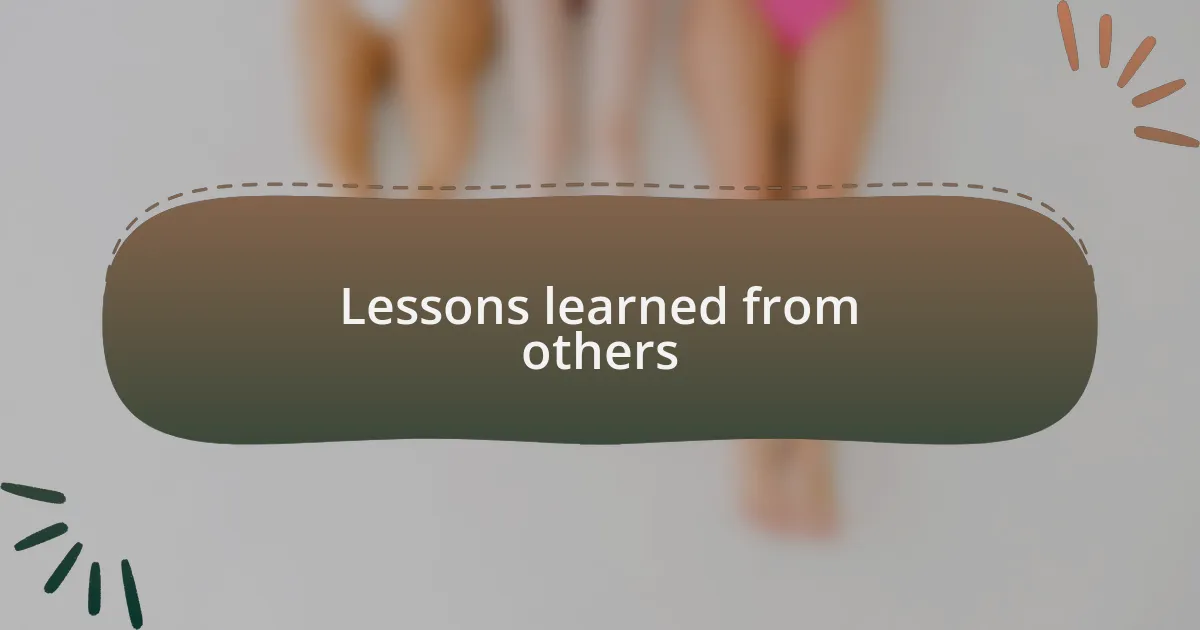
Lessons learned from others
Listening to the stories shared by others was profoundly enlightening. I remember a participant who discussed her experience navigating a male-dominated field. Her determination in the face of adversity taught me that resilience isn’t just an individual journey; it’s a collective one. It made me wonder, how often do we underestimate the power of simply sharing our experiences with one another?
During one session, we took turns expressing our fears and hopes. Hearing someone articulate a fear I had buried deep within me was jarring yet liberating. In that moment, I realized that vulnerability fosters connection. It leads to authentic conversations where I could find solace, knowing I wasn’t alone in my battles. Have you ever felt that overwhelming relief when someone voices what you’ve been scared to admit?
On another occasion, a discussion erupted on the importance of allyship. A man in the group shared how he had once witnessed a derogatory comment aimed at a female coworker. He reflected on his hesitation to speak up in the moment and the regret that followed. His story was a powerful reminder that our voices can either amplify or silence the struggles of others. It prompted me to consider: how can I be a better ally in my daily life, not just within the safe space of our meetings?
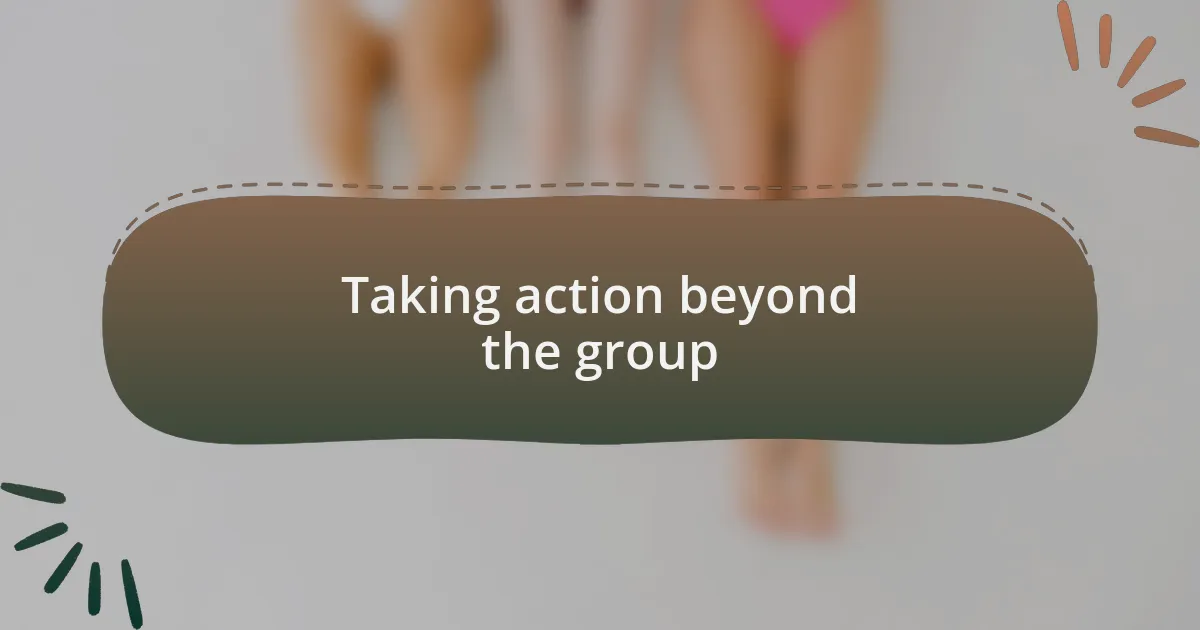
Taking action beyond the group
Taking action beyond the group often starts with a shift in mindset. After my time in the support group, I found myself more attuned to the dynamics in my workplace. One day, during a meeting, I noticed a colleague’s ideas going unrecognized. It was a moment that prompted me to speak up, not just for her sake but because I realized that allowing voices to fade away entrenches inequality. Have you ever caught yourself holding back when you knew you should intervene?
In my daily life, I also began to see opportunities for advocacy that I could embrace. I started organizing lunch-and-learns focused on gender equality, engaging everyone from entry-level employees to managers. It was powerful to watch people from different backgrounds come together to share their own experiences and insights. Each session felt like a ripple effect, inspiring others to take their own actions. Isn’t it remarkable how one small conversation can spark so much change?
There was a particularly transformative moment when I volunteered at a local women’s shelter. Listening to the women share their stories of struggle and survival was both heart-wrenching and invigorating. It solidified my belief that true advocacy extends beyond discussions; it requires tangible efforts. How can we ensure that our actions align with our values? I realized that when we step outside our comfort zones, we not only grow ourselves but also create pathways for others to follow.